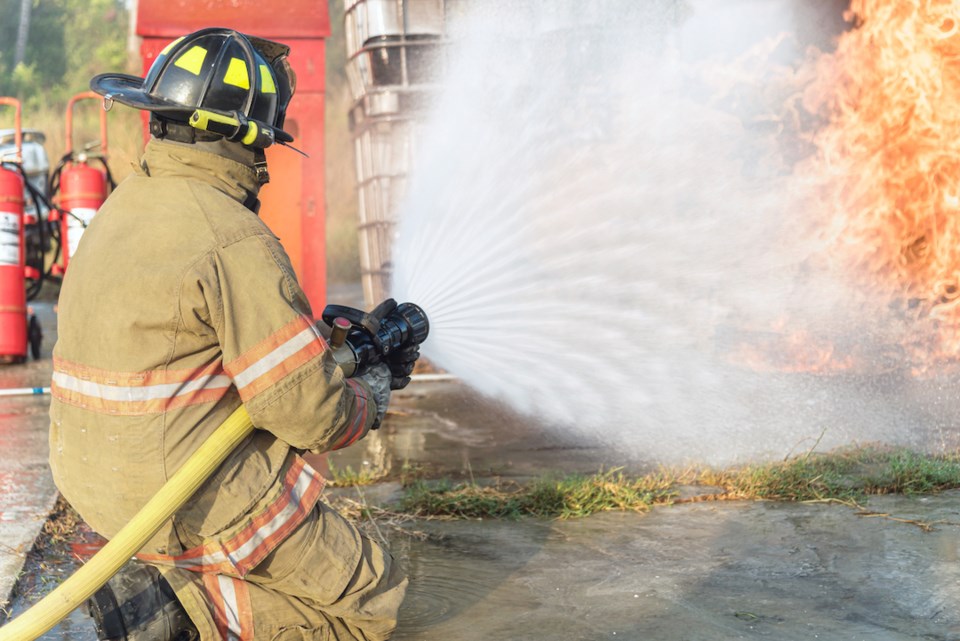Sunshine Coast Regional District (SCRD) leaders maintained that there was enough water for firefighting needs throughout last year’s drought crisis at a special Sechelt committee of the whole on May 31.
Delegates from the SCRD and Sechelt Fire Protection District met with the committee to discuss a letter penned by the protection district board of trustees chair, Ray Monteith, in April, voicing concern that should drought conditions reach the same state as last year, “the ability of the Sechelt Fire Department to provide the high level of fire protection the community expects and requires will once again be seriously compromised.”
SCRD CAO Dean McKinley, who was among the delegates, said the SCRD and fire protection district representatives had met since the letter was published and clarified some of the statements within. They also committed to better communication among parties, as it became clear that the water crisis illuminated communication gaps between the organizations.
“There was no intent to be alarmist in any of this,” said Sechelt fire chief Trevor Pike, another delegate. “Our intent [with the letter] was to alert mayor and council to the fact that there is a concern regarding our ability to [provide] fire protection services to the best of our ability.”
Up to the date the letter was written, the Sechelt department was unable to get proof “that there was no potential to run out of water or at the very least have reduced pressure in our systems,” Pike said. “For any fire chief, that's going to be a legitimate concern.”
SCRD board chair Leonard Lee – another delegate – said it had been communicated in a press release, in Coast Reporter and they thought to all of the fire departments at the time, that “there was enough water for hospital, essential residents use and fire until at least mid-December," which was well past the expected time of a significant rain event. In a follow-up with Coast Reporter, Lee acknowledged that the communication at the time was "too cryptic" and wasn't clear with its message – to the public and to the fire department – that there was enough water for those essential uses. At the meeting, Lee added that they weren’t specific in releases about how much water was left, which would have been helpful for fire departments.
At the meeting, McKinley spoke to how the system worked during the drought. “We were tested as we've never been tested before on November 7,” he said. That day, in the midst of the state of emergency and three months into Stage 4 restrictions, a Selma Park home burned in what Pike called at the time Sechelt’s “biggest structural fire of 2022 so far.” The department managed to keep the fire from spreading and saved the homes on either side of the doomed structure.
“There was adequate water to fight that fire and the next day, all the reservoirs were refilled,” McKinley said. “If there was ever a test of whether or not…Stage 4 was successful, the reason we called it, the focus we put on it, the closures we did, the businesses we turned off water [to]…it was all because the hospital needed it or in case there was a structural fire.
“There was [a fire] and there was enough water.”
McKinley said “there’s many things” the local governments are doing to make sure there’s more water this year than last and that he feels like “we're in a better situation this year than we were last year.”
Just like in California
Water communication isn’t just an issue on the Sunshine Coast. McKinley said their communications manager reached out to areas that had been dealing with critical drought for years, like the people who manage Lake Powell, Lake Mead and communities in California, for advice on sharing drought information with residents. Overwhelmingly, people from those regions replied that it’s incredibly difficult to create bite-size easily digestible information as the situations are so complex, said McKinley. “It's so dynamic, it's ever-changing and you can't control it.” He also acknowledged that the SCRD needed to do better.
A few other tidbits
- Asked about the timing of campfire bans, Pike said all of the fire departments on the Coast enact their bans at the same time so as to lessen confusion among residents. The fire departments follow the guidance of BC Wildfire.
- Asked about the Dusty Road well Sechelt is exploring as a non-potable water source, Pike said the site is of “very limited use” to the fire department. Depending on where a fire happens, there would be the potential for shuttle runs, but that’s labour-intensive. “It would definitely be a part of our backup emergency water supply plan,” said Pike, “[But] the chances of us using it would be minimal and mostly because of location.”
- On water meters, McKinley said they figure that they’re going to gain 30 to 40 per cent water availability through the installation of meters and their leak detection capacity. That being said, even with active leak fixing, “you're going to lose between 10 to 20 per cent of your water every year to leaks just because of aging infrastructure,” he said.
- Asked if he could return to talk to Sechelt's elected about interface fire, Pike said "absolutely." "It's the single biggest concern that we have as a fire department, not only here in Sechelt but across the entire Coast."



